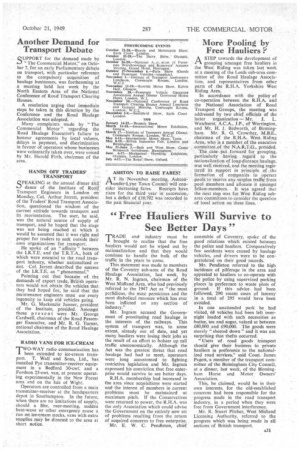"Free Hauliers Will Survive to See Better Days"
Page 33

If you've noticed an error in this article please click here to report it so we can fix it.
TRADE and industry must be brought to realize that the free hauliers would not he wiped out by nationalization and that 'they would continue to handle the bulk of the traffic in the years to come.
This statement was made to members of the Coventry sub-area of the Road Haulage Association, last week, by Mr. R. N. Ingram, chairman of the West Midland Area, who had previously referred to the 1047 Act as "the most perfidious, the most pernicious and the most diabolical measure which has ever been inflicted on any section of industry."
Mr. Ingram accused the Government of prostituting road haulage in the interests of the railways. This system of transport was, to some extent, already out of date, and yet many hauliers were losing their jobs as the result of an effort to bolster up rail traffic uneconomically. Although the Act was the greatest threat that road haulage had had to meet, operators were long accustomed to fighting restrictive legislation and Mr. Ingram expressed his conviction that free enterprise would survive to see better days.
R.H.A. membership had increased in the area since acquisitions were started and the interest of members in current problems must be maintained at maximum pitch. If the Conservatives were returned to power, the-R.H.A. was the only Association which could advise the Government on the entirely new set of problems resulting from the return of acquired concerns to free enterprise.
Mr. E. W. C. Pendleton, chief constable of Coventry, spoke of the good relations which existed between the police and hauliers. Comparatively few accidents were caused by haulage vehicles, and drivers were to be congratulated on their good records.
Mr. Pendleton referred to the high incidence of pilferage in the area and appealed to hauliers to co-operate with the police by using supervized parking places in preference to waste plots of ground. If this advice had been followed, 290 recent cases of larceny in a total of 295 would have been avoided.
In one unattended park he had visited, 68 vehicles had been left overnight loaded with such necessities as butter, tea and sugar, valued at between £80,000 and 00,000. The goods were merely "sheeted down " and it was not surprising that thefts occurred.
"Users of road goods transport should give their business to private hauliers in preference to the nationalized road services," said Coon. James Pagett, a member of the transport committee of the Birmingham City Council, at a dinner, last week, of the Birmingham Horse and Motor Owners' Association.
This, he claimed, would be in their own interests, for the old-established concerns had been responsible for the progress made in the road transport industry, in a period when they were free from Government interference_ Mr. R. Stuart Pitcher, West Midland Licensing Authority, referred to the progress which was being made in all sections of British transport.




























































































